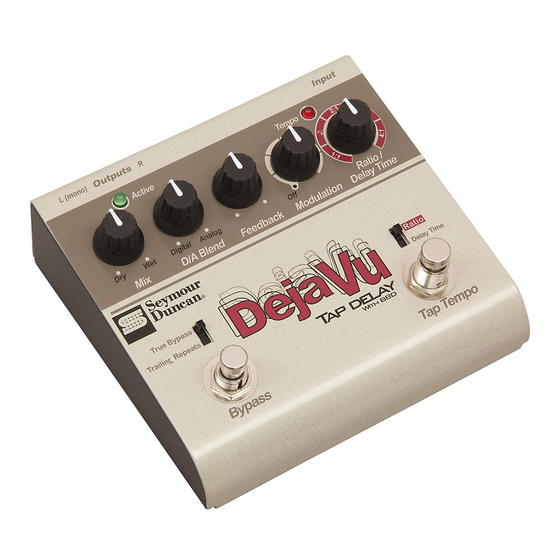Duncan SFX-10 Deja Vu Benutzerhandbuch - Seite 5
Blättern Sie online oder laden Sie pdf Benutzerhandbuch für Musik-Pedal Duncan SFX-10 Deja Vu herunter. Duncan SFX-10 Deja Vu 17 Seiten. Tap delay w/bbd

Back Panel
1. Input Jack – Plug in your guitar signal here or if compatible, the send
from your amp's effects loop.
2. Power Jack – This is where you can connect a 9-volt DC adapter
(center negative) if you opt not to run the Déjà Vu on a 9-volt
battery. See notes on battery life on page 14.
3. Wet Out/Insert – This jack serves multiple purposes. It can be used
as a "wet only" output, shutting the wet signal off to the outputs, to
create separate wet and dry signals. With an insert cable, however, it's
a wet loop. This means you can send only your delays through any
other effect or signal processor imaginable, and return to the feedback
loop. Imagine delays with phaser or tremolo on them, or customized
EQ settings, Wah pedal, the possibilities are endless! Insert a volume
pedal and it becomes your delay level expression pedal, controlling the
amount of delay.
4. FB Insert – Also an insert jack, this pedal interrupts the feedback
send. Insert a volume pedal for expression control over the amount of
repeats, or insert compressors/expanders/gates to achieve customized
delay trails.
5. Right Output Jack – Provides the right output signal, which contains
a phase inverted wet sound, like our favorite old analog stereo chorus,
flange, and delay units. Run a cable from this jack to the second input of
a stereo effects return, stereo power amp, or a second amplifier.
6. Left (mono) Output Jack – In addition to being the left output in a
stereo setup, use this jack for mono operation. When set to True Bypass,
this is where the True Bypass occurs. Run a cable from this jack to the
input of a guitar amp or if compatible, the return jack of your amp's
effects loop.
5
